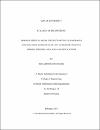Drained residual shear strength of fine-grained soils and soil-solid interfaces at low to medium effective normal stresses: Analyses and Applications
| Advisor | Eid, Hisham T. |
| Author | Rabie, Khaled H. |
| Available date | 2016-12-05T10:21:00Z |
| Publication Date | 2016 |
| Abstract | A laboratory research program was undertaken to study the large-strain shear strength characteristics of fine-grained soils under low effective normal stresses (~3 to 6 kPa). Soils that cover a wide range of plasticity and composition were utilized in the program. The interface shear strength of these soils against a number of solid surfaces having different roughness was also investigated at similar low effective normal stress levels. The findings contribute to advancing the knowledge on the parameters needed for the design of pipelines placed on sea beds and the stability analysis of shallow soil slopes. A Bromhead-type torsional ring shear apparatus was modified to suit measuring soil-soil and soil-solid interface drained residual shear strengths at the low effective normal stresses. In consideration of increasing the accuracy of assessment and depicting the full-scale field behavior, the interface residual shear strengths measured using the modified ring shear apparatus were compared with those measured by research collaborators for similar interfaces using a macro-scale interface direct shear device with a plan interface shear area of approximately 3.0 m2. Correlations are developed to estimate the soil-soil and soil-solid interface residual shear strengths at low effective normal stresses. The correlations are compared with soil-soil and soil-solid interface drained residual shear strengths and correlations presented in the literature. Data of torsional ring shear tests at a wide range of effective normal stress (10 to 700 kPa) for soils, mudstones and shales of different plasticity and gradation were analyzed. The data were made available for this research to study the effects of the change in non linearity of shear strength envelope over the normal stress ranges relevant to soil slope stability analyses. Using this data set, new empirical residual shear strength correlations were developed as a function of soil index parameters and wide range of effective normal stresses. In essence, the correlations are presented as revised versions of those previously developed for a limited number of normal stresses utilizing the same soil index parameters. Comparisons were made with a considerable amount of back-calculated shear strength data reported in the literature for reactivated landslides as well as results predicted from existing shear strength correlations to verify the increased suitability of the new correlations for use in slope stability analyses. A numerical expression was also introduced to express the residual shear strength correlations for direct incorporation in slope stability software. |
| Sponsor | Qatar National Research Fund (QNRF), Qatar, under Projects No: NPRP 08–203–2–064, and NPRP 5-488-2-194 |
| Language | en |
| Subject | Interface strength Landslides Shear strength Geotechnology Civil engineering Nonlinearity Pipelines Offshore engineering Software Slope stability Residual strength Empirical correlation Roughness Coating Soils Large-strain shear strength |
| Type | Master Thesis |
| Department | Civil Engineering |
Files in this item
This item appears in the following Collection(s)
-
Civil Engineering [48 items ]


